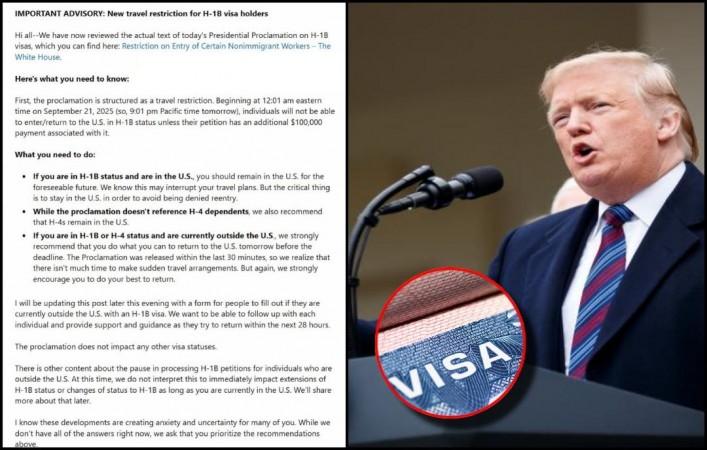
Microsoft on Saturday instructed its H-1B and H-4 visa employees to return to the United States immediately, ahead of the September 21 deadline announced by President Donald Trump following the imposition of a $100,000 annual fee on the program, according to an internal email reviewed by Reuters.
The tech giant further advised H-1B visa holders already in the US to continue working in the country "for the foreseeable future."
"H-1B visa holders should stay in the US for the foreseeable future. We also recommend H-4 visa holders remain in the US. Strongly recommend H-1B and H-4 visa holders return to the US before the deadline tomorrow," the email read.
This guidance comes as one of the first responses from a major tech firm amid widespread concerns over how the new fee could impact the IT sector. JPMorgan has also advised H-1B holders currently outside the US to return before 12:01 a.m. ET on September 21, according to a separate internal memo reviewed by Reuters.
Rationale Behind the Fee
Commerce Secretary Howard Lutnick defended the new rules, calling them a corrective measure. He stated that prior employment-based visa policies allowed workers earning below-average salaries—many of whom relied on government assistance—to enter the country. The revised program aims to filter out the "bottom quartile" of earners while generating more than $100 billion in revenue for the US Treasury. President Trump said the funds would help reduce national debt and lower taxes.
OFFICIAL EMAIL FROM MICROSOFT pic.twitter.com/dPJHknPOdY
— ADHIRA (@Adhira_9999) September 20, 2025
Impact on Indian IT Professionals
The announcement has significant implications for India, as roughly 71% of H-1B visa holders are Indian, predominantly employed in the technology sector. Major IT firms—including Infosys, Wipro, Cognizant, and Tata Consultancy Services—rely heavily on the program to deploy engineers and developers on US projects. With visas typically valid for three years and renewable up to six, the new $100,000 annual fee could make it prohibitively expensive for companies to retain Indian talent, especially given the decades-long Green Card wait.
List of top H-1B sponsors (employers) in US
— FII DII Data (@fiidiidata) September 19, 2025
Lot of Indian companies in there ??
$100,000 fee for H-1B Visa = 88 Lakh Indian rupees pic.twitter.com/wp27ynaIeY
Market Reaction and Industry Concerns
Following the announcement, shares of US-listed Indian IT firms fell between 2% and 5%, Reuters reported. Critics argue that the measure discourages talent mobility and stifles innovation, while supporters say it prevents wage suppression and encourages companies to invest in training American graduates.

















